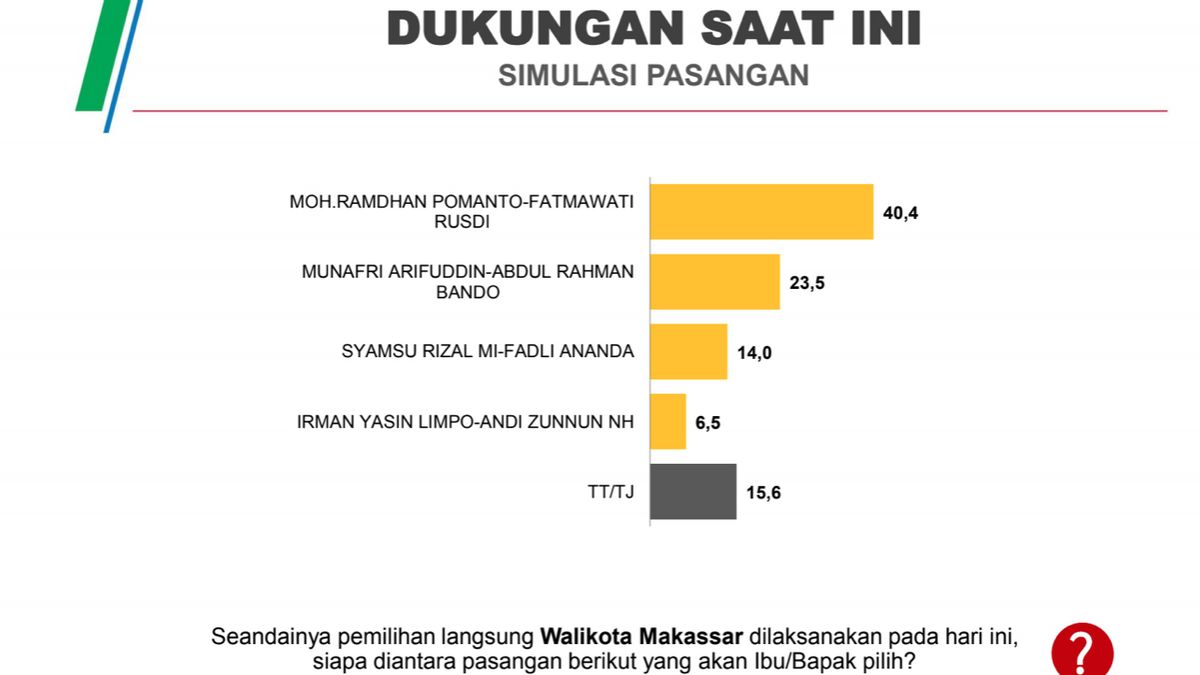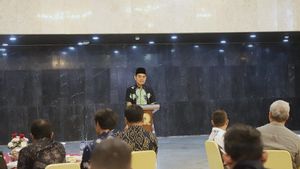MAKASSAR - The Celebes Research Center (CRC) survey shows the level of support for M Ramdhan Pomanto-Fatmawati Rusdi is superior to its competitors in the Makassar Pilkada. Following Danny Pomanto-Fatmawati, there was the Munafri Arifuddin-Abdul Rahman Bando (Appi-Rahman) pair.
From the survey release received by VOI , Monday, October 12, it is explained that 1,000 respondents were presented with a number of questions in the questionnaire that were distributed face-to-face. Sampling error is +/- 3 percent with a confidence level of 95 percent. The sample of respondents came from 15 sub-districts in Makassar which were proportionally distributed in the survey from 25 September to 5 October.
Respondents were asked the question 'if the direct election for the mayor of Makassar was held today which of the following pairs would you vote for' and here are the results:
1. Moh Ramdhan Pomanto-Fatmawati Rusdi 40.4 percent
2. Munafri Arifuddin-Abdul Rahman Bando 23.5 percent
3. Syamsu Rizal-Fadli Ananda 14 percent
4. Irman Yasin Limpo-Andi Zunnun 6.5 percent
5. Don't know / don't answer 15.6 percent
Meanwhile, from the level of popularity and acceptance in Makassar society, Danny Pomanto is still superior to the candidate for mayor Syamsu Rizal (Deng Ical).
1. Moh Ramdhan Pomanto 94.4 percent
2. Syamsu Rizal 83.6 percent
3. Irman Yasin Limpo 81.5 percent
4. Munafri Arifuddin 81.5 percent
5. Fatmawati Rusdi 55.8 percent
6. Abdul Rahman Bando 43.6 percent
7. Fadli Ananda 37.3 percent
8. Andi Zunnun 27.3 percent
The survey illustrates issues regarding social conditions that are of concern to the community. CRC shows the public's attention to economic difficulties (15.7 percent), difficulty finding work (12.1 percent), floods (10.7 percent), unemployment (8 percent), high prices of basic necessities (6.4 percent), difficulties clean water (6.1 percent).
Meanwhile, the expectations of Makassar residents for programs that must be prioritized by the candidate pair for the head of the Makassar region are creating jobs (42 percent), poverty alleviation (13.1 percent), controlling prices for basic necessities (9.9 percent), handling the impact of floods (6.4 percent) and infrastructure development of 5.3 percent.
The English, Chinese, Japanese, Arabic, and French versions are automatically generated by the AI. So there may still be inaccuracies in translating, please always see Indonesian as our main language. (system supported by DigitalSiber.id)













